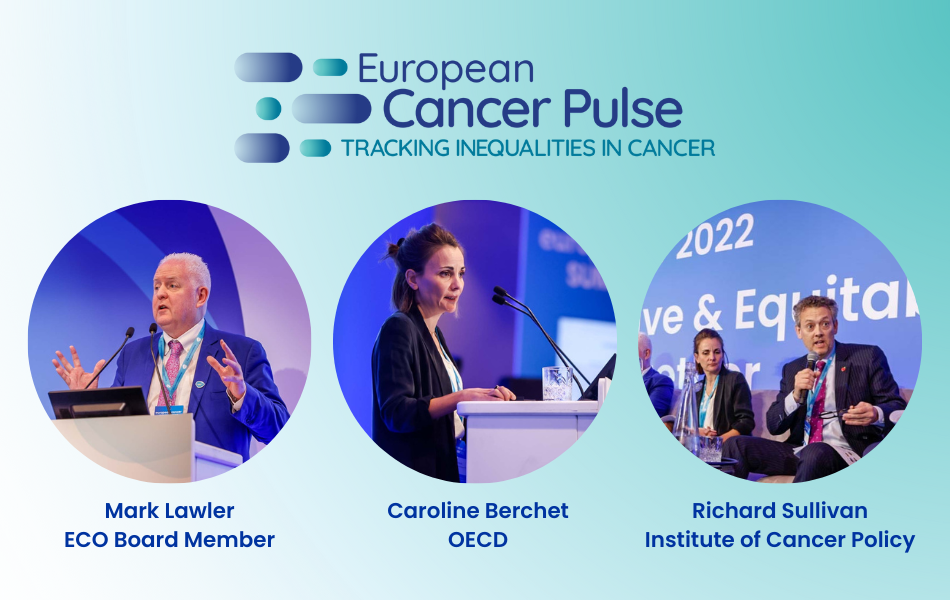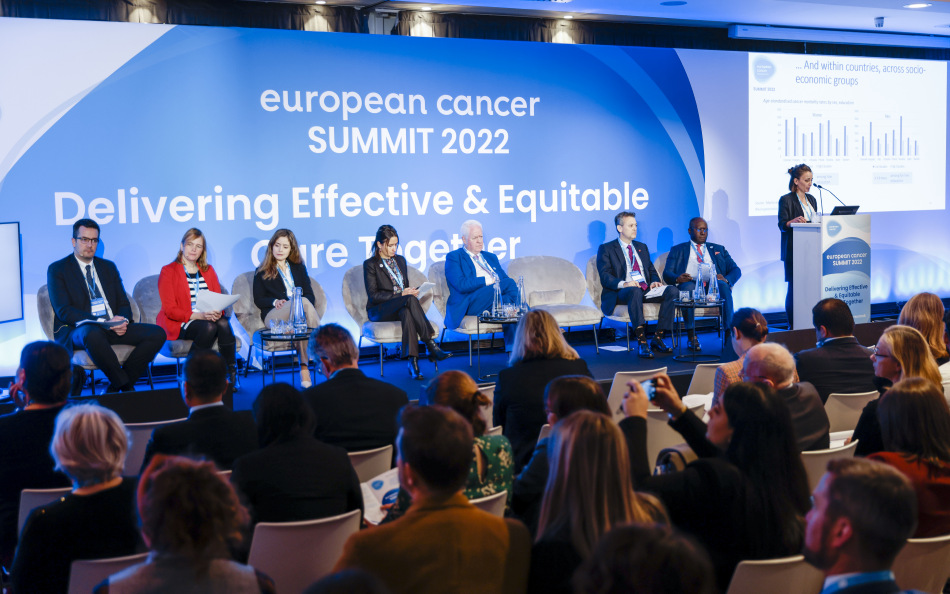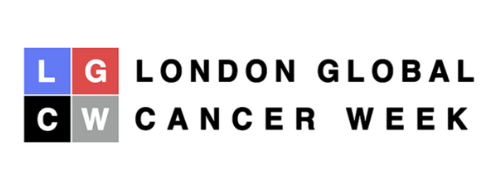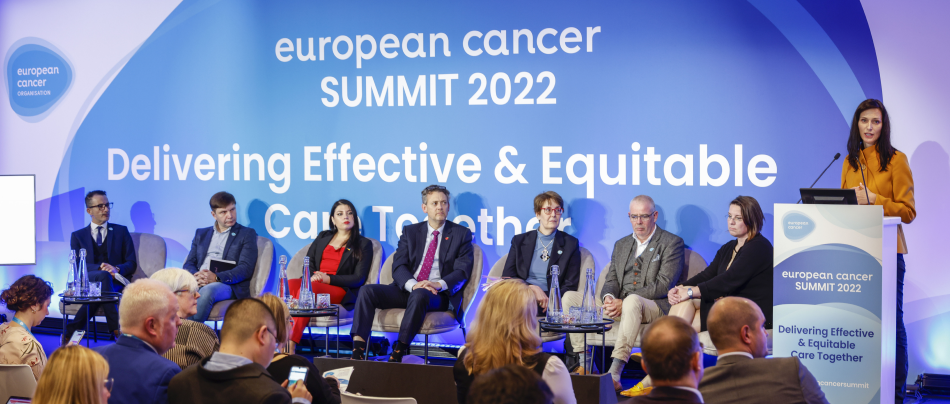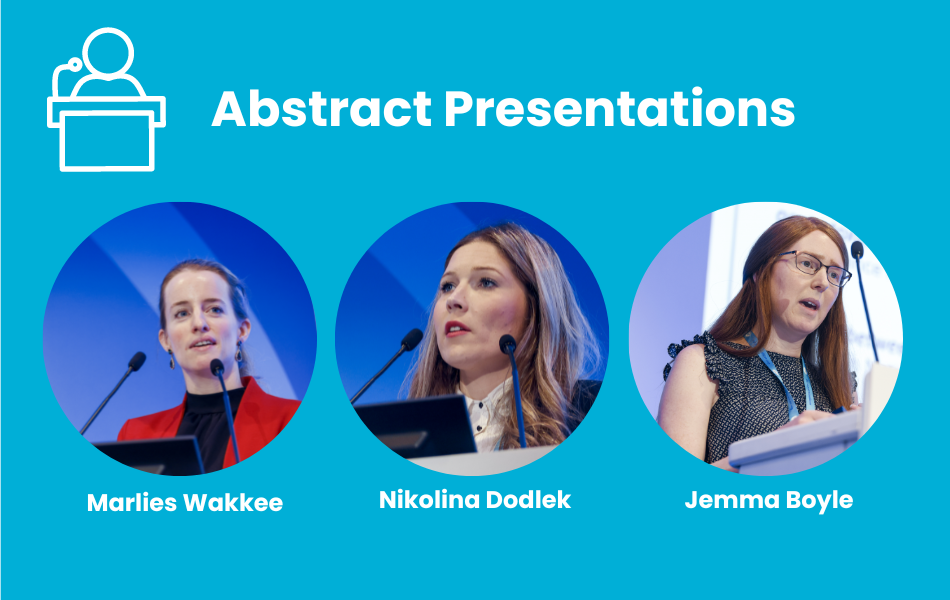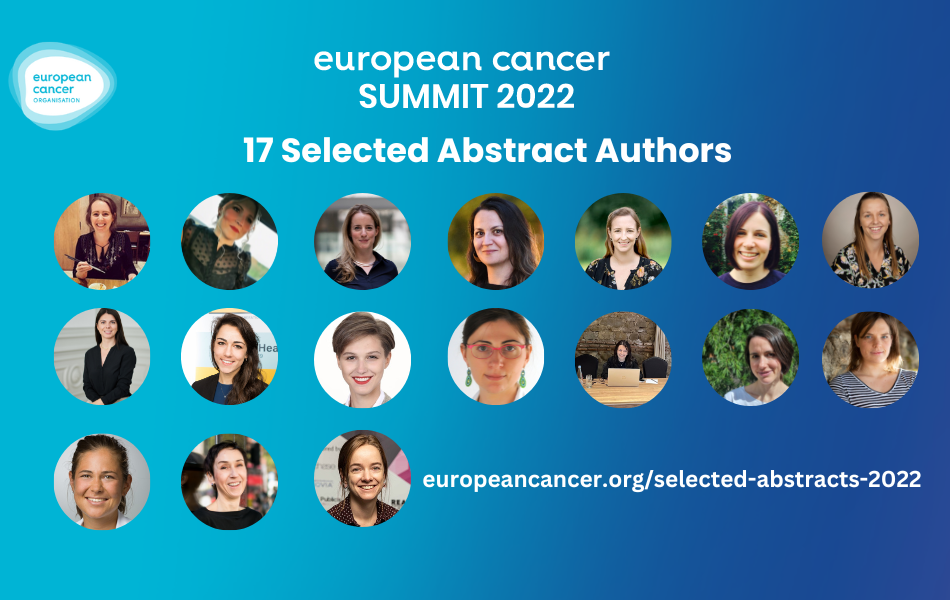Every year, at the European Cancer Summit, the European Cancer Organisation brings together leading oncology experts, experienced patient advocates, key opinion leaders, policy makers and politicians to discuss key issues in reducing the burden of cancer, saving, and improving the lives of patients and the public.
This year’s European Cancer Summit was on 16-17 November and focused on delivery and collaboration, including through our ten Focused Topic Networks.
We planned this year’s Summit as a hybrid event with the majority of speakers and delegates getting a chance to meet face-to-face in Brussels and others able to join virtually, bringing together the European cancer community including our Member Societies and Patient Advocacy groups.
The European Cancer Summit is a key event in the cancer policy calendar. Our goal is to showcase the multi-stakeholder, collaborative efforts being made, to ensure tangible results. We believe this exchange will help to improve outcomes for cancer patients and raise awareness of the many significant challenges of cancer.
High-Level Speakers
See who joined us "on stage" here.
Sessions with Relevance & Impact
The European Cancer Summit 2022 Programme co-chairs Ajay Aggarwal and Gilliosa Spurrier-Bernard guided the development of an impactful programme with leading speakers.
Watch all session recordings on the European Cancer Organisation's event area here. These are now available to delegates at the Summit and the public.

With the support of visit.brussels and the Brussels-Capital Region
Speakers
-
Stella Kyriakides European Commissioner for Health and Food Safety
-
Mariya Gabriel European Commissioner for Innovation, Research, Culture, Education and Youth
-
Hans Kluge Regional Director, World Health Organization Europe (WHO Europe)
-
Jakub Dvořáček Deputy Health Minister for the Czech Presidency of the Council of the European Union
-
Sara Cerdas MEP Board Member, EU40, and Member, Special Committee on the Covid-19 Pandemic (COVI)
-
Deirdre Clune MEP Member, Special Committee on the Covid-19 Pandemic (COVI)
Speakers
-
Stella Kyriakides European Commissioner for Health and Food Safety
-
Mariya Gabriel European Commissioner for Innovation, Research, Culture, Education and Youth
-
Hans Kluge Regional Director, World Health Organization Europe (WHO Europe)
-
Jakub Dvořáček Deputy Health Minister for the Czech Presidency of the Council of the European Union
-
Sara Cerdas MEP Board Member, EU40, and Member, Special Committee on the Covid-19 Pandemic (COVI)
-
Deirdre Clune MEP Member, Special Committee on the Covid-19 Pandemic (COVI)
European Cancer Summit 2022 Speakers
-
Stella Kyriakides European Commissioner for Health and Food Safety
-
Mariya Gabriel European Commissioner for Innovation, Research, Culture, Education and Youth
-
-
Jakub Dvořáček Deputy Health Minister for the Czech Presidency of the Council of the European Union Read Bio
-
Sara Cerdas MEP Board Member, EU40, and Member, Special Committee on the Covid-19 Pandemic (COVI) Read Bio
-
-
Nicolás González Casares MEP Member, Committee on the Environment, Public Health and Food Safety (ENVI) Read Bio
-
Kateřina Konečná MEP Member, Special Committee on the Covid-19 Pandemic (COVI)
-
-
Dolors Montserrat MEP Rapporteur, Special Committee on the COVID-19 pandemic (COVI) and Former Spanish Health Minister
-
Alessandra Moretti MEP Member, SPECIAL COMMITTEE ON THE COVID-19 PANDEMIC (COVI)
-
Tomislav Sokol MEP Secretary General, EU40 and Member, Special Committee on the Covid-19 Pandemic (COVI) Read Bio
-
Nicolae Ștefănută MEP Board Member, EU40, and Member, Committee on the Environment, Public Health and Food Safety (ENVI) Read Bio
-
-
Istvan Ujhelyi MEP Member, Committee on the Environment, Public Health and Food Safety (ENVI)
-
Cathal Crowe MP National Parliamentarian, Ireland
-
Morgana Danielė MP Member, Committee on Health Affairs, Lithuania
-
Marek Krajčí MP Former Minister of Health, Slovakia
-
Jurgita Sejonienė MP Member, Committee on Health Affairs, Lithuania
-
Valeriy Zub MP Chair, Prevention and Control of Cancer Subcommittee, Ukraine Parliament
-
-
Diana Stoica MP Member of the Committee for Health, Romania
-
Andrea Crisanti MP Senator, Italian parliament, and Professor of microbiology, University of Padova
-
Romilda Baldacchino Zarb MP Pharmacist, Malta
-
Andrei Baciu Secretary of State for Health, Romania
-
Sandra Gallina Director-General, DG SANTE
-
-
Andre Ilbawi Cancer Control Officer, World Health Organization (WHO)
-
Natasha Azzopardi-Muscat Director of the Division of Country Health Policies and Systems, WHO Europe Read Bio
-
Niclas Jacobson Deputy Director-General & Head of the Division for European and International Affairs, Swedish Ministry of Health Read Bio
-
Eric Winer President, American Society of Clinical Oncology (ASCO)
-
-
-
Richard Sullivan Director, Institute of Cancer Policy; Editor-in-Chief, Journal of Cancer Policy; Emergency Committee Member, World Health Organization (WHO)
-
Roman Shyyan Surgical Oncologist, Lviv State Regional oncology treatment and diagnostic Center, Ukraine
-
-
-
Gilberto Lopes Editor-in-chief, JCO Global Oncology, American Society of Clinical Oncology (ASCO) Read Bio
-
Anna Uzlova CEO, Charity Foundation "Inspiration Family" and Cancer Survivor
-
-
-
-
Ajay Aggarwal Co-Chair, European Cancer Summit 2022, and Board Member, European Cancer Organisation Read Bio
-
Gilly Spurrier-Bernard Co-Chair, European Cancer Summit 2022, and Vice-Chair, European Cancer Organisation's Patient Advisory Committee
-
-
-
-
Aasim Yusuf Chief Medical Officer, Gastroenterologist, Shaukat Khanum Memorial Cancer Hospital and Research Centre, Pakistan
-
Daisy Le Assistant Research Professor of Health Disparities and Oncology, George Washington University School of Nursing
-
Laurence Court Director of The Radiation Planning Assistant Project, Division of Radiation Oncology, The University of Texas MD Anderson Cancer Center Read Bio
-
Clare Bennett Reader, School of Healthcare Sciences, Cardiff University, and Co-Director, Wales Centre for Evidence Based Care
-
Gauthier Bouche Director of Clinical Research, Anticancer Fund
-
Michail Ignatiadis Chair of the Breast Cancer Group, European Organization for Research and Treatment of Cancer (EORTC) Read Bio
-
-
Rebecca Fitzgerald Co-Chair, SAPEA Project, Professor of Cancer Prevention, and Director of the Early Detection Institute, University of Cambridge Read Bio
-
Jan Van Der Meulen Professor of Clinical Epidemiology, London School of Hygiene and Tropical Medicine Read Bio
-
-
Yvonne Wengström Professor, Karolinska Institute
-
-
-
Jemma Boyle ST3 General Surgery trainee, National Bowel Cancer Audit, Royal College of Surgeons of England Read Bio
-
Nikolina Dodlek Executive Board Member Young Cancer Nurse, EONS
-
Marlies Wakkee Associate Professor and Dermatologist, Erasmus MC Cancer Institute and Chairperson of Tumor Focus Group Melanoma Read Bio
-
-
-
-
Matti Aapro Chair, INTERACT-EUROPE Advisory Board, and Past President, European Cancer Organisation Read Bio
-
Ruth Ladenstein Professor in Paediatrics, Senior Consultant for Paediatric Haematology and Head of the Clinical Trials Unit at the Children’s Cancer Research Institute in Vienna
-
Gabriella Pravettoni Professor of Cognitive Psychology, University of Milan and Director, Psycho-Oncology Division, European Institute of Oncology
-
Lesley Smith Senior Programme Manager for Living With and Beyond Cancer (LWBC), NHS England Read Bio
-
Nina Linder Associate Professor, University of Helsinki, Senior Scientist, Institute for Molecular Medicine Finland Read Bio
-
Natacha Bolaños Head, Membership and Alliances, Lymphoma Coalition and Member, Patient Advisory Committee, European Cancer Organisation
-
Jan Geissler CEO and Founder, Patvocates and Member, Patient Advisory Committee, European Cancer Organisation
-
Rachel Giles Chair, International Kidney Coalition and Member, Patient Advisory Committee, European Cancer Organisation Read Bio
-
Anne-Marie Baird President, Lung Cancer Europe and Member, Patient Advisory Committee, European Cancer Organisation Read Bio
-
Teodora Kolarova Executive Director, International Neuroendocrine Cancer Alliance and Member, Patient Advisory Committee, European Cancer Organisation Read Bio
-
-
-
-
-
Carlo Catalano Co-Chair, Digital Health Network, European Cancer Organisation
-
Sarah Collen Co-Chair, Inequalities Network, European Cancer Organisation
-
Mirjam Crul Board Member and Co-Chair, Workforce Network and Special Network on the Impact of Covid-19 on Cancer, European Cancer Organisation Read Bio
-
Csaba Dégi Board Member and Co-Chair, Survivorship and Quality of Life Network, European Cancer Organisation Read Bio
-
Daniel Kelly Co-Chair, HPV Action Network, European Cancer Organisation
-
Denis Lacombe Co-Chair, Health Systems and Treatment Optimisation Network, European Cancer Organisation
-
Mark Lawler Board Member and Co-Chair, Special Network on the Impact of Covid-19 on Cancer
-
Yolande Lievens Co-Chair, Health Systems and Treatment Optimisation, European Cancer Organisation
-
Rui Medeiros Co-Chair, HPV Action Network, European Cancer Organisation
-
Simon Oberst Board Member and Co-Chair, Quality Cancer Care Network, European Cancer Organisation
-
Fedro Peccatori Board Member and Co-Chair, Quality Cancer Care Network, European Cancer Organisation
-
Wim Oyen Treasurer and Co-Chair, Digital Health Network, European Cancer Organisation
-
Beate Rau Board Member and Co-Chair, Workforce Network, European Cancer Organisation
-
Isabel Teresa Rubio Board Member and Co-Chair, Prevention, Early Detection and Screening Network, European Cancer Organisation
-
Nevenka Krčevski Škvarč Co-Chair, Survivorship and Quality of Life Network, European Cancer Organisation
-
Jan van Meerbeeck Co-Chair, Prevention, Early Detection and Screening Network, European Cancer Organisation
-
-
Amadou Diarra Senior Vice President, Global Policy and Government Affairs, Bristol Myers Squibb (BMS)
-
-
-
-
Andy Powrie-Smith Executive Director of Communications & Partnerships, European Federation of Pharmaceutical Industries and Associations (EFPIA) Read Bio
-
Faisal Mehmud Vice President, International Developed Markets Medical Head, Pfizer Oncology Read Bio
-
-
-
Barbara McLaughlan Senior Director, Government Affairs, Astellas
Speakers
-
Stella Kyriakides European Commissioner for Health and Food Safety
-
Mariya Gabriel European Commissioner for Innovation, Research, Culture, Education and Youth
-
Hans Kluge Regional Director, World Health Organization Europe (WHO Europe)
-
Jakub Dvořáček Deputy Health Minister for the Czech Presidency of the Council of the European Union
-
Sara Cerdas MEP Board Member, EU40, and Member, Special Committee on the Covid-19 Pandemic (COVI)
-
Deirdre Clune MEP Member, Special Committee on the Covid-19 Pandemic (COVI)
Registration closed
Speakers
-
Stella Kyriakides European Commissioner for Health and Food Safety
-
Mariya Gabriel European Commissioner for Innovation, Research, Culture, Education and Youth
-
Hans Kluge Regional Director, World Health Organization Europe (WHO Europe)
-
Jakub Dvořáček Deputy Health Minister for the Czech Presidency of the Council of the European Union
-
Sara Cerdas MEP Board Member, EU40, and Member, Special Committee on the Covid-19 Pandemic (COVI)
-
Deirdre Clune MEP Member, Special Committee on the Covid-19 Pandemic (COVI)
European Cancer Summit 2022 Programme
Watch all session recordings on the European Cancer Organisation's event area here. These are now available to delegates at the Summit and the public.
Wednesday 16 November 2022
8:45-9:00 Opening Session
Andreas Charalambous, European Cancer Organisation's President, Ajay Aggarwal and Gilly Spurrier-Bernard, European Cancer Summit 2022 Co-Chairs opened this year's European Cancer Summit together.
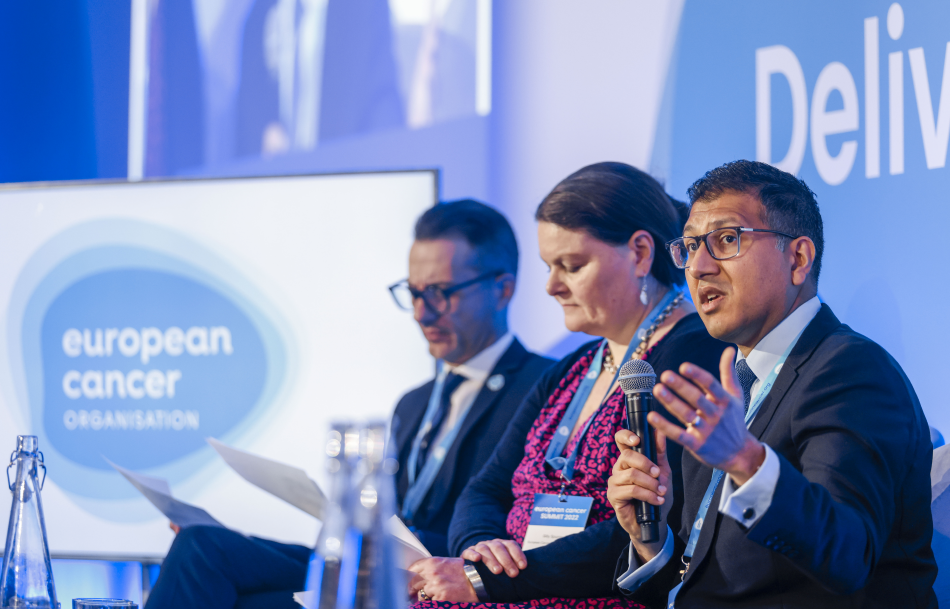
9:00-10:15 Action on Cancer Inequalities: Our Shared Roadmap
This has been a year of turning plans into action. Notable amongst these is the publication of the first iteration of a new EU Cancer Inequalities Registry, and the start of several Beating Cancer Plan initiatives, including: an EU Network of Comprehensive Cancer Centres; a European-wide campaign against HPV cancers; and an inter-speciality cancer training programme.
This opening session officially launched the landmark report ‘European Groundshot—addressing Europe’s cancer research challenges: a Lancet Oncology Commission’. Its 12 evidence-based recommendations provide a roadmap to achieving a 70% survival rate, on average, for all cancer patients in Europe by 2035.
The European Cancer Organisation also shared a new tool developed by its Inequalities Network, the European Cancer Pulse. It provides an extensive complement to the EU Cancer Inequalities Registry and highlights a range of additional cancer inequalities across the continent.
With Inequalities Network Co-Chairs Nicolò Matteo Luca Battisti and Sarah Collen, including speakers:
- Caroline Berchet, Health Economist OECD, Health Division
- Richard Sullivan, Director, Institute of Cancer Policy; Editor-in-Chief, Journal of Cancer Policy; Emergency Committee Member, World Health Organization (WHO)
- Marcia Costa, Senior Editor, The Lancet Oncology
- Mark Lawler, Board Member, European Cancer Organisation
- Teodora Kolarova, Executive Director, International Neuroendocrine Cancer Alliance (INCA), and Member, Patient Advisory Committee, European Cancer Organisation
- Amadou Diarra, Senior Vice President, Global Policy & Government Affairs, Bristol Myers Squibb
10:15-10:30 Coffee Break
10:30-11:45 SmartCARE. A Fit-for-Future Cancer Survivorship Agenda
The centrepiece of Europe’s Beating Cancer Plan was the promise to fund a ‘Better Life for Cancer Patients Initiative’. It includes: a Cancer Survivor Smart-Card (SmartCARE project); a European Cancer Patient Digital Centre; and official EU studies on the return-to-work needs of cancer survivors and the forms of discrimination they may encounter, including from financial services providers. The Survivorship and Quality of Life session took stock of the latest developments.
With Survivorship and Quality of Life Network Co-Chairs Csaba Dégi and Nevenka Krčevski Škvarč, including speakers:
- Kateřina Konečná MEP, Member, Special Committee on the Covid-19 Pandemic (COVI)
- Gabriella Pravettoni, Professor of Cognitive Psychology, University of Milan and Director, Psycho-Oncology Division, European Institute of Oncology
- Lesley Smith, Senior Programme Manager for Living With and Beyond Cancer (LWBC), NHS England
- Ruth Ladenstein, Professor in Paediatrics, Senior Consultant for Paediatric Haematology and Head of the Clinical Trials Unit at the Children’s Cancer Research Institute in Vienna
- Carina Schneider, Managing Director, Childhood Cancer International Europe
- Alexander Zehnder, Global Head of Oncology, Sanofi
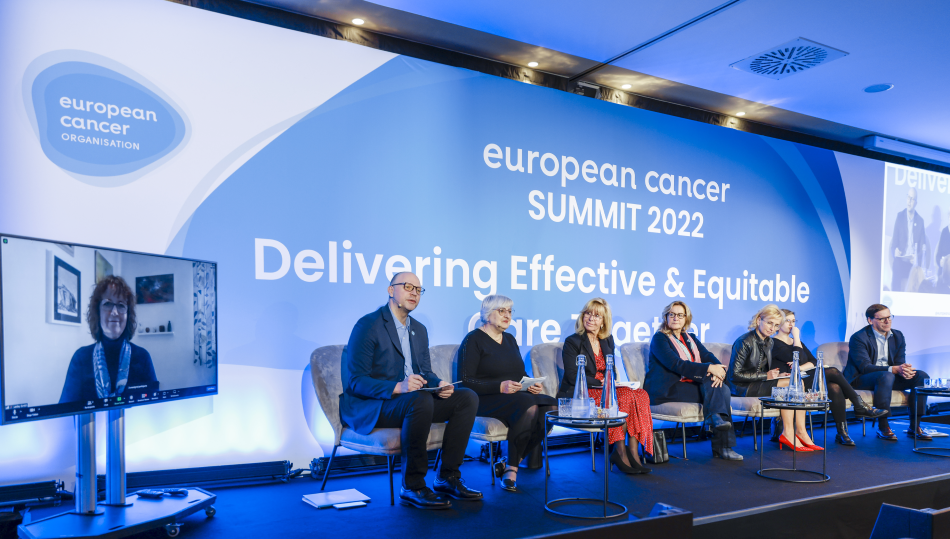
11:45-12:00 Coffee Break
12:00-13:15 Embedding Outcome Measurement in Quality Cancer Care: Where Are We Now?
Across Europe, with an EU level cancer plan now complementing an array of national cancer plans, and a noteworthy focus on achieving an EU Network of Comprehensive Cancer Centres, how can we gain a fuller picture of the interventions and investments that yield the strongest improvements in outcomes? To such questions directors of pioneer cancer centres across Europe have been providing significant focus. The session provided an opportunity for sharing of experience and perspective. This included exchanges with patient advocates and the healthcare industry for their insights on fit-for-purpose outcome measurement in oncology.
With Quality Cancer Care Network Co-Chairs Simon Oberst and Fedro Peccatori, including speakers:
- Deirdre Clune MEP, Member, Special Committee on the COVID-19 pandemic (COVI)
- Jean-Yves Blay, President, French Federation of Cancer Centres, Unicancer
- Yvonne Wengström, Professor, Karolinska Institute
- Cinzia Brunelli, Researcher, National Cancer Institute, Milan
- Jan Van Der Meulen, Professor of Clinical Epidemiology, London School of Hygiene and Tropical Medicine
- Anne-Marie Baird, President, Lung Cancer Europe
- Jamie Partridge, Senior Director, Global Health Economics & Outcomes Research, Oncology, Bayer Pharmaceuticals
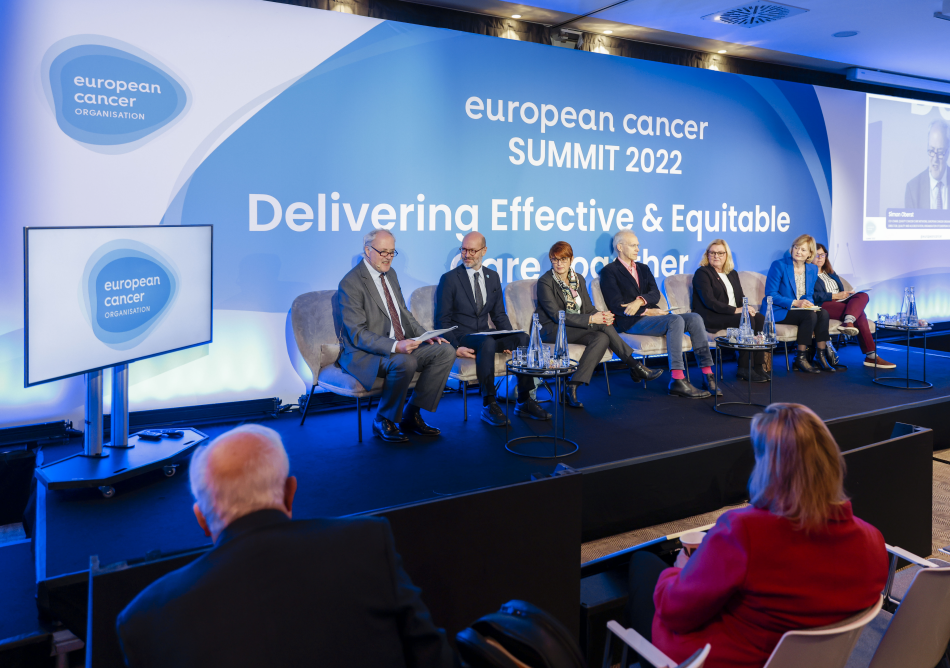
13:15-14:15 Networking Lunch
For this Networking Lunch, we encouraged you to meet your colleagues from around the world and take stock of the sessions up until this point. Delegates also got a chance to view the posters of the 17 selected abstracts which were displayed on the walls in the lunch area.
14:15-15:30 The Oncology Workforce: We Must Act – and INTERACT – to Provide Effective and Equitable Cancer Care
Effective and equitable cancer care does not only concern the provision of advanced medications and machinery. It requires teams of trained professionals who bring multidisciplinary and multi-professional care to life. This is where INTERACT-EUROPE comes into play, our recently awarded 18-month EU4Health project. Together, we aim to set the standard for inter-specialty cancer training in Europe.
During this session, we looked at the level to which current EU policy is supporting the growth and development of oncology professions. We also explored new technological advances and ways to bolster the resilience of the oncology workforce, especially considering the experiences of Covid-19.
| With Workforce Network Co-Chairs Mirjam Crul and Beate Rau, including speakers: |
- Alessandra Moretti MEP, Member, Special Committee on the Covid-19 Pandemic (COVI)
- Kim Benstead, Co-Chair, INTERACT-EUROPE project
- Niall O’Higgins, Co-Chair, INTERACT-EUROPE project
- Matti Aapro, Chair, INTERACT-EUROPE Advisory Board, and Past President, European Cancer Organisation
- Isabel Teresa Rubio, President, European Society of Surgical Oncology (ESSO)
- Gilly Spurrier-Bernard, Co-Chair, European Cancer Summit 2022 and Vice-Chair, Patient Advisory Committee, European Cancer Organisation
- Markus Kosch, Head of Oncology Europe, Daiichi Sankyo
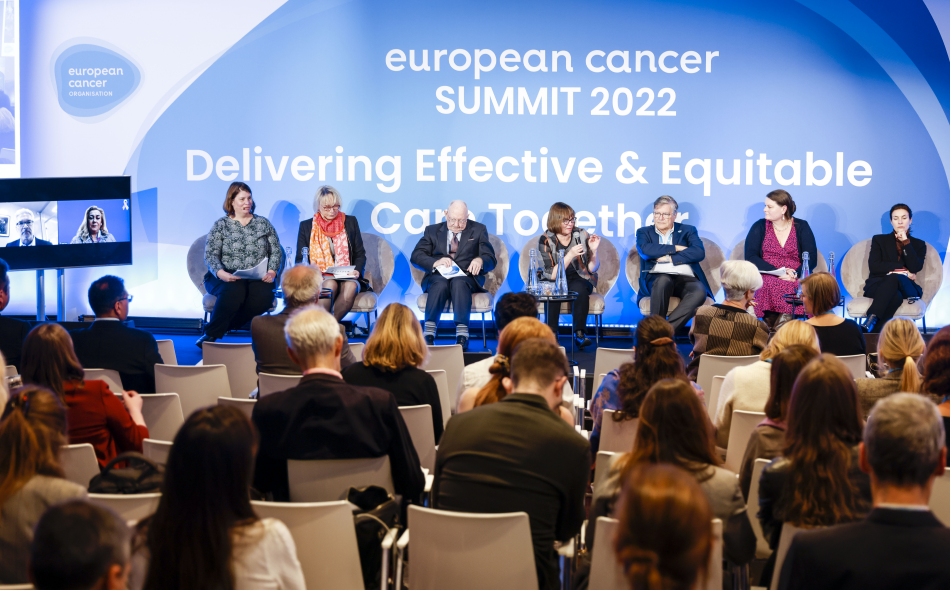
15:30-15:45 Coffee Break
15:45-16:55 Supporting Ukrainian Cancer Patients and Cancer Services: Immediate Needs and Longer-term Rebuilding
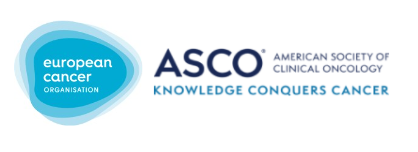
Inspired by the heroism of patient organisations and healthcare professionals in Ukraine, the session of the ECO-ASCO Special Network: Impact of the War in Ukraine on Cancer called upon the views of leading actors in Europe’s response to the healthcare and cancer care needs of the War. Valeriy Zub MP, Anna Uzlova, the CEO of a pre-eminent Ukrainian cancer patient organisation, and Roman Shyyan, a cancer surgeon joining live from Lviv, related day-to-day experiences and outlined ways in which the European and international cancer community can go further in restoring services and addressing the twin battles that Ukrainian cancer patients must now endure: that of their cancer, and that of the war.
> In collaboration with London Global Cancer Week
With Special Network Co-Chairs Andreas Charalambous, President, and Eric Winer, American Society of Clinical Oncology's President, including speakers:
- Hans Kluge, Regional Director, World Health Organization Europe (WHO Europe)
- Sandra Gallina, Director-General, DG SANTE
- Valeriy Zub MP, Chair, Prevention and Control of Cancer Subcommittee, Ukraine Parliament
- Richard Sullivan, Director, Institute of Cancer Policy; Editor-in-Chief, Journal of Cancer Policy; Emergency Committee Member, World Health Organization (WHO)
- Roman Shyyan, Surgical Oncologist, Lviv State Regional Oncology Treatment and Diagnostic Center, Ukraine
- Anna Uzlova, CEO, Inspiration Family Ukraine
- Bettina Ryll, Founder, Melanoma Patient Network Europe
- Andy Powrie-Smith, Executive Director of Communications & Partnerships, European Federation of Pharmaceutical Industries and Associations (EFPIA)

16:55-17:05 Coffee Break
17:05-18:20 The EU’s Cancer Policy Agenda: A Progress Report and Sense Check
Followed by a Networking Drinks Reception. See below for more information.
Fewer issues are closer to the heart of every citizen than the health and wellbeing of themselves and those they love. The EU’s ambitious agenda on cancer has a clear and real prospect of changing and improving lives by helping to reduce cancer incidence, speeding early detection of cancer, enhancing treatment and outcomes, upscaling European cancer research, and embedding new foundational approaches to cancer survivorship and follow-up care. Implementation of Europe’s Beating Cancer Plan and the EU Research Mission on Cancer are advancing at pace. The annual European Cancer Summit serves as a time and a place for the European cancer community to convene together and share views on the progress made so far, bring attention to any roadblocks in delivery, and cast eyes to the next Missions, Plans and Actions to come.
With Andreas Charalambous, President, and Gilly Spurrier-Bernard, European Cancer Summit 2022 Co-Chair, including speakers:
- Stella Kyriakides, European Commissioner for Health and Food Safety
- Mariya Gabriel, European Commissioner for Innovation, Research, Culture, Education and Youth
- Jakub Dvořáček, Deputy Minister for the Czech Presidency of the Council of the European Union
- Tomislav Sokol MEP, Secretary General, EU40, and Member, Special Committee on the Covid-19 Pandemic (COVI)
- Bente Mikkelsen, Director, Non-Communicable Diseases, World Health Organization (WHO)
- Niclas Jacobson, Deputy Director-General & Head of the Division for European and International Affairs, Swedish Ministry of Health
- Alexandru Eniu, Deputy Scientific Director, European School of Oncology (ESO)
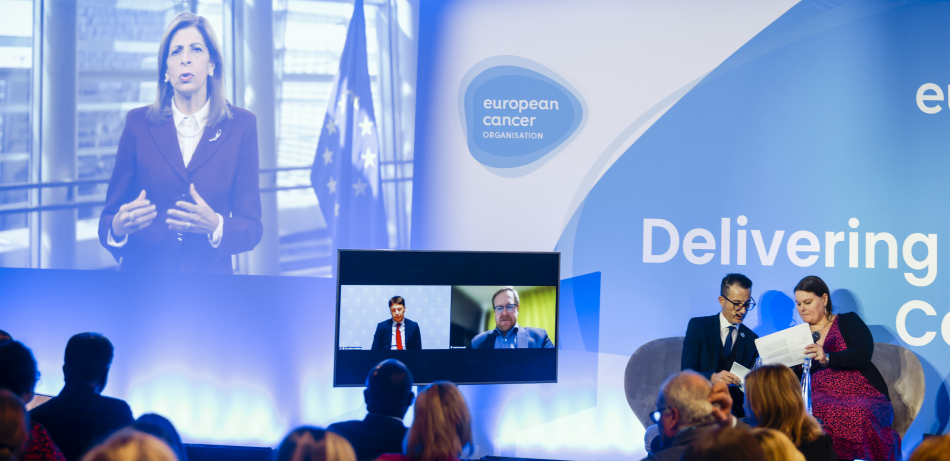
18:20-20:00 Networking Drinks Reception
All Summit attendees were warmly invited to join our speaker faculty and leaders of Europe's oncology professional societies, cancer patient organisations and other stakeholder associations for a drinks reception, kindly supported by visit.brussels, and further conversation upon the day's key themes such as cancer inequalities, survivorship and quality of life, outcome measurement, workforce training needs, Ukraine's cancer care needs, and the achievements of EU cancer policy to date.
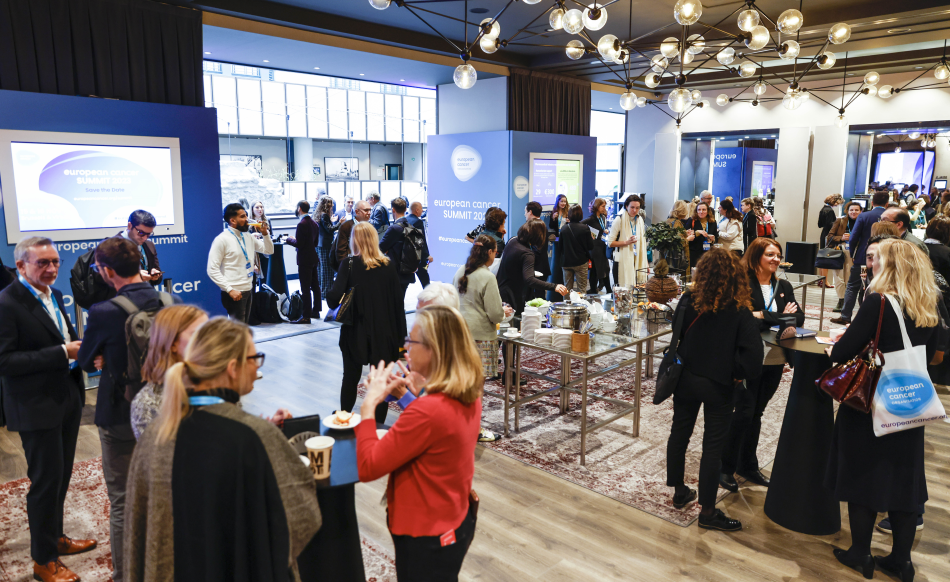
Thursday 17 November 2022
9:00-10:15 Saving Lives by Anticipating Actions: Getting it right on Screening and Early Detection
This has been a landmark year for Europe’s Beating Cancer Plan, especially in early detection and its screening pillar. In March, the European Commission issued its latest scientific advice: a long-overdue update on EU recommendations to Member States on cancer screening. Notably, scientific advisors included new advice on lung, prostate and gastric cancer screening, alongside the already existing advice to countries on breast, cervical and colorectal cancer screening.
This summit session heard from those most closely involved in the advisory process. They discussed the implementation journey ahead for the new recommendations, and how early detection needs can be met through coordinated policy interventions beyond screening.
Also check out our Open Letter on Screening to EU and National Level Decision-Makers.
With Prevention, Early Detection and Screening Network Co-Chairs Isabel Teresa Rubio and Jan van Meerbeeck, including speakers:
- Nicolás González Casares MEP, Member, Committee on the Environment, Public Health and Food Safety (ENVI)
- Gilberto Lopes, Editor-in-chief, JCO Global Oncology, American Society of Clinical Oncology
- Dorothy Keefe, Chief Executive, Cancer Australia
- Rebecca Fitzgerald, Co-Chair, SAPEA Project, Professor of Cancer Prevention, and Director of the Early Detection Institute, University of Cambridge
- Eva Kondorosi, European Commission’s Group of Chief Scientific Advisors
- Rachel Giles, Chair, International Kidney Coalition
- Barbara McLaughlan, Senior Director, Government Affairs, Astellas
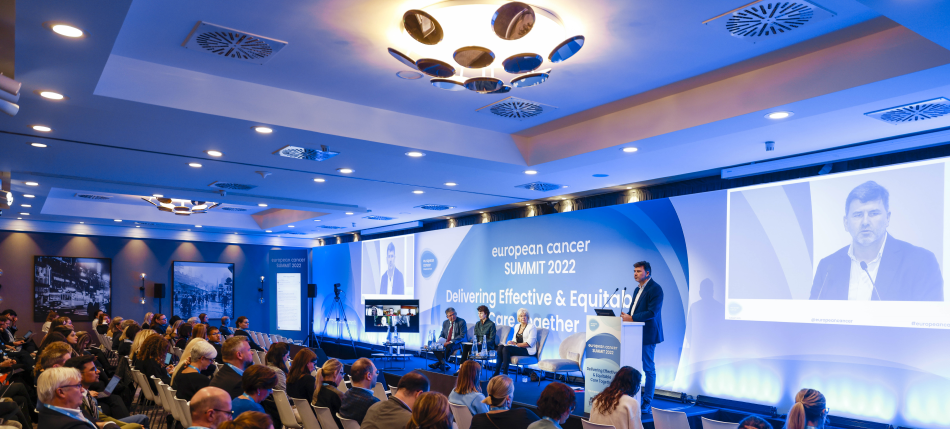
10:15-10:30 Coffee Break
10:30-11:45 Better Than Before Is Possible: The Essential Rebuilding Blocks for Cancer Services Since Covid-19
It is reasonable to consider the worst of the Covid-19 pandemic to be behind us, without diminishing vigilance for the winter ahead. Following the evidence, recommendations and political will generated by the Covid-19 and Cancer Time to Act campaign, what is the present status of the build back and what are the pressing priorities for action? Guided by information from the Time To Act Data Navigator, the session heard from leading patients, healthcare professionals, politicians and industry speakers working at the front end of cancer service response and build back following the challenges created by the Covid-19 pandemic. The session also described latest recommendations from the cancer community to Governments and the EU on cancer service recovery and re-building, via an update to the Covid-19 and Cancer Network’s 7 point plan.
With Special Network on the Impact of Covid-19 on Cancer Co-Chairs Mirjam Crul and Mark Lawler, including speakers:
- Dolors Montserrat MEP, Rapporteur, Special Committee on the Covid-19 Pandemic (COVI), and Former Spanish Health Minister
- Natasha Azzopardi-Muscat, Director of the Division of Country Health Policies and Systems, WHO Europe
- Venus Mushininga, Program Manager, NCDs, Ministry of Health and Childcare, Zimbabwe
- Aasim Yusuf, Chief Medical Officer, Gastroenterologist, Shaukat Khanum Memorial Cancer Hospital and Research Centre, Pakistan
- Natacha Bolaños, Head, Membership and Alliances, Lymphoma Coalition, and Member, Patient Advisory Committee, European Cancer Organisation
- Faisal Mehmud, Vice President, International Developed Markets Medical Head, Pfizer Oncology
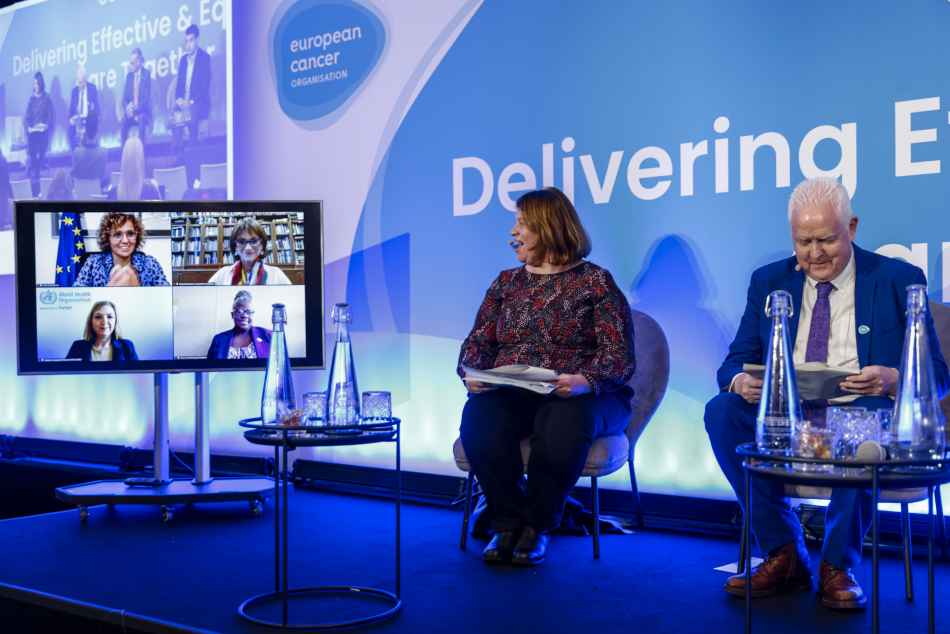
11:45-12:00 Coffee Break
12:00-13:00 Reflections on the Present and Future of Cancer Care: Perspective of Young Cancer Professionals

As a future-focused event, the European Cancer Summit took time to harness views and aspirations in cancer policy from emerging leader figures under the age of 45. From political, international, industrial, practice and other perspectives, the degree to which present trends and cancer policy emphasis are meeting the hopes of younger advocates will be examined.
And the best authors of chosen abstracts, all listed below, presented during this session.
> In collaboration with EU40
With Andreas Charalambous, President, and Ajay Aggarwal, Summit Co-Chair, including speakers and abstract authors:
- Sara Cerdas MEP, Board Member, EU40, and Member, Special Committee on the Covid-19 Pandemic (COVI)
- Nicolae Stefanuta MEP, Board Member, EU40, and Member, Committee on the Environment, Public Health and Food Safety (ENVI)
- Andre Ilbawi, Cancer Control Officer, World Health Organization (WHO)
- Sebastian Arias, Global Access Policy Leader, Roche
- Abstract author: Jemma Boyle, ST3 General Surgery trainee,National Bowel Cancer Audit, Royal College of Surgeons of England
- Abstract author: Nikolina Dodlek, Executive Board Member Young Cancer Nurse, EONS
- Abstract author: Marlies Wakkee, Associate Professor and Dermatologist, Erasmus MC Cancer Institute and Chairperson of Tumor Focus Group Melanoma
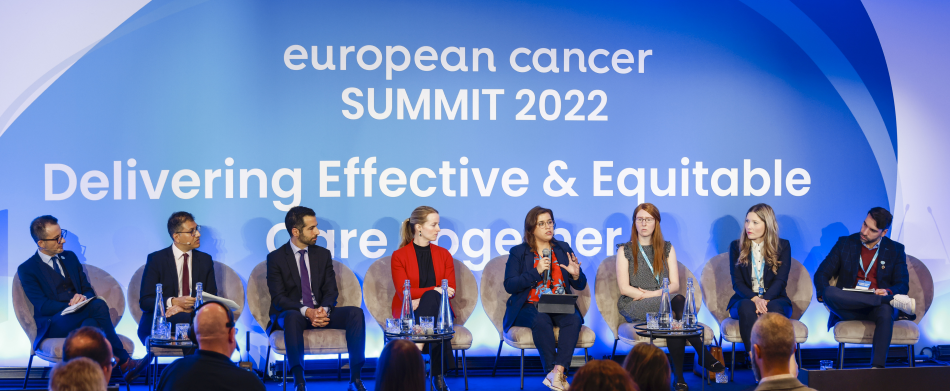
13:00-13:45 Poster Presentations & Lunch
After the above session dedicated to the future of cancer professionals, delegates were invited to personally meet the authors of the 17 selected abstracts and learn more about their work, ambitions and next steps.
13:45-15:00 Health Systems and Treatment Optimisation: Scanning the Political Horizons
The health system and treatment optimisation agenda, as promoted in consensus resolution and declarations of previous European Cancer Summits, continues to make elements of progress under the present EU political cycle. However, could more be reasonably expected beyond the immediate political horizon? This session of the European Cancer Summit facilitated exchange and the sharing of achievable policy ambition to bring about sought after reorientation of health systems and research approaches in cancer.
With Health Systems and Treatment Optimisation Network Co-Chairs Denis Lacombe and Yolande Lievens, including speakers:
- Véronique Trillet-Lenoir MEP, Member, Special Committee on the Covid-19 Pandemic (COVI)
- Gauthier Bouche, Director of Clinical Research, Anticancer Fund
- Michail Ignatiadis, Chair, Breast Cancer Group, European Organization for Research and Treatment of Cancer (EORTC)
- Katie Spencer, Academic Clinical Oncologist, University of Leeds
- Jan Geissler, CEO and Founder, Patvocates, and Member, Patient Advisory Committee, European Cancer Organisation
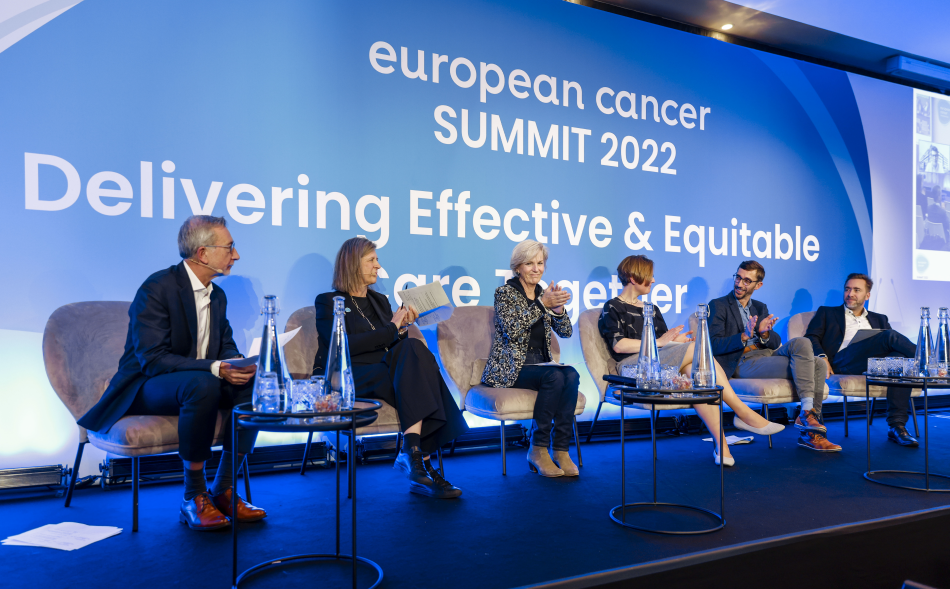
15:00-15:15 Coffee Break
15:15-16:30 PROTECTing EUROPE: Eliminating the Cancers Caused by HPV
Now is the time for decisive action on HPV. The PROTECT-EUROPE project, funded by the EC and led by ECO with some 33 partners from 16 countries, will contribute to an increase in vaccine confidence among parents, carers and young people. It will increase vaccine uptake in all genders in line with the commitment in Europe's Beating Cancer Plan. PROTECT-EUROPE launches in January 2023.
WHO Europe's new Roadmap to accelerate the elimination of cervical cancer across the region aims to increase HPV vaccination rates (although primarily in girls), improve screening programmes (using HPV DNA testing and self-sampling), and improve access to treatment and care. The Roadmap provides the basis for further actions to tackle all the cancers caused by HPV.
Single-dose HPV vaccination, this year recommended by the WHO globally and already approved for the UK, should make it easier and cheaper for vaccine programmes to switch to gender-neutral.
Taking advantage of these developments, ECO's 'Action Now on HPV' project will support advocacy work in countries which are falling behind in HPV cancer elimination. Pilots will start in Romania and Bulgaria and, in 2023, a total of up to 10 countries will be engaged.
With HPV Action Network Co-Chairs Daniel Kelly and Rui Medeiros, including speakers:
- Alin Mituta MEP, Member, Special Committee on the Covid-19 Pandemic (COVI)
- Patrick Howard, Penile Cancer Survivor
- Clare Bennett, Reader, School of Healthcare Sciences, Cardiff University, and Co-Director, Wales Centre for Evidence Based Care
- Daisy Le, Assistant Research Professor of Health Disparities and Oncology, George Washington University School of Nursing
- Andrea Gerosa, Founder, ThinkYoung
-
Sibilia Quilici, Executive Director, Vaccines Europe
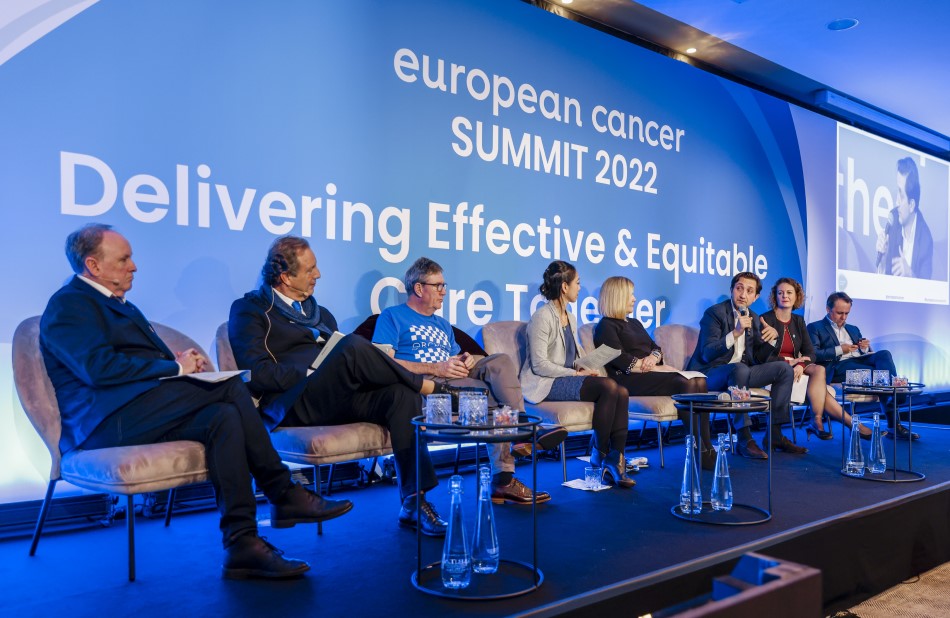
16:30-16:45 Coffee Break
16:30: Informal Meeting of the LGBTQI+ Workstream of the Inequalities Network
The LGBTQI+ Workstream of the Inequalities Network had an informal first meeting with Nicolò Battisti (Co-Chair of the Inequalities Network) and Cianán Russell, (Senior Policy Officer, ILGA Europe). We thank all delegates who joined!
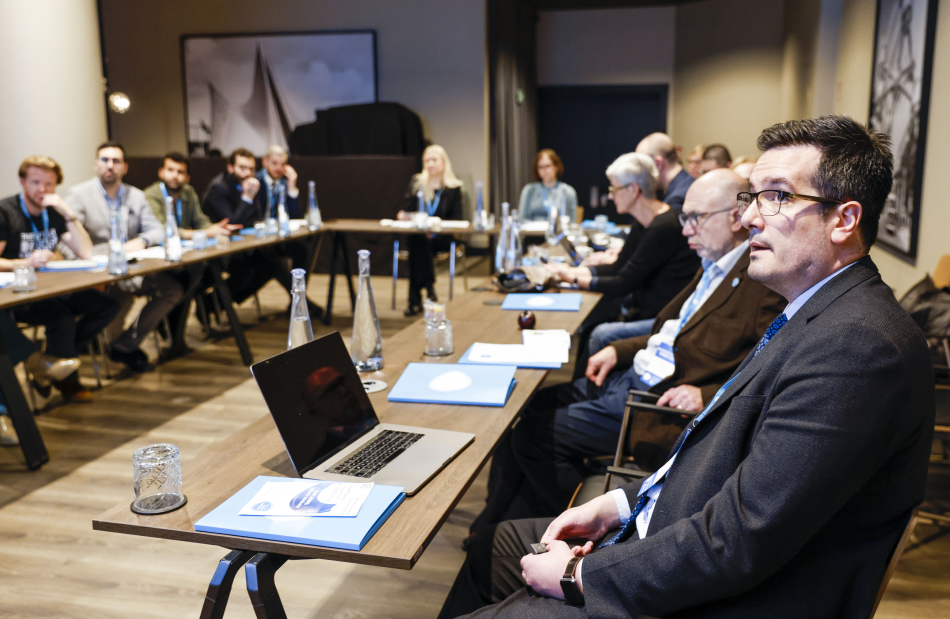
16:45-18:00 Bringing Digital Transformation of Cancer Care to Fruition
As set out in the ECO consensus paper, No Stopping Us Now!, the benefits of digital technology for improving cancer care are clear. Yet frustration persists with a perception of slower than hoped for progress in major areas such as international oncology data collaboration, and sufficient preparation of health systems, including oncology professionals, for larger scale adoption and uptake in areas such as Artificial Intelligence. This session took perspectives from national ministries, international oncology leaders and EU decision-makers about the current state of the art and the realities of digital change management in the oncology, with reference to present political priorities such as the establishment of a European Health Data Space.
With Digital Health Network Network Co-Chairs Carlo Catalano and Wim Oyen, including speakers:
- Fulvia Raffaelli, Head of Digital Health, DG SANTE
- Tobias Silberzahn, Partner, McKinsey & Company
- Laurence Court, Director, The Radiation Planning Assistant Project, Division of Radiation Oncology, The University of Texas MD Anderson Cancer Centre
- Denis Costello, Executive Director, CML Advocates Network
- Ebba Hallersjö Hult, Co-founder and Head of Vision Zero Cancer
- Nina Linder, Associate Professor, University of Helsinki, Senior Scientist, Institute for Molecular Medicine Finland
- Angel Martín, Senior Director, Digital Health and Taxation Advocacy EMEA, Janssen
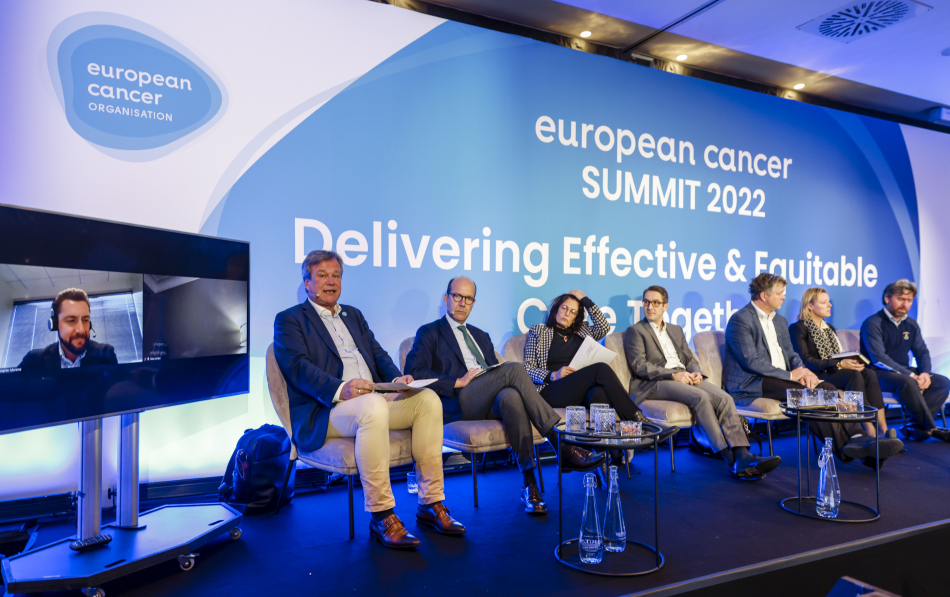
18:00-18:30 Our Next Steps: National and European Parliamentarians for Cancer Action
Followed by a Networking Drinks Reception. See below for more information.
 |
 |
After two full days of sessions exploring how Europe can move further forward faster in making cancer care more effective and equitable, the final session of the European Cancer Summit gave emphasis to the next steps in bringing ideas to reality and converting words into action.
Importantly, to increase the political traction and connection between national and EU based cancer initiative, and heighten impetus on combatting cancer inequality, the European Cancer Organisation launched a new network for political cooperation: National and European Parliamentarians for Cancer Action.
Legislators from national capitals as well as Brussels exchanged together on their key takeaways from the Summit and outlined areas for priority cooperation and attention in the year to come.
With Andreas Charalambous, President, Ajay Aggarwal, Gilly Spurrier-Bernard, our European Cancer Summit 2022 Co-Chairs , as well as leading cancer policy makers, MEPs and MPs from across Europe:
- Tomislav Sokol MEP, Secretary General, EU40, and Member, Special Committee on the Covid-19 Pandemic (COVI)
- Istvan Ujhelyi MEP, Member, ENVI Committee, Hungary
- Valeriy Zub MP, Chair, Prevention and Control of Cancer Subcommittee, Ukraine Parliament
- Andrei Baciu, Secretary of State for Health, Romania
- Cathal Crowe MP, National Parliamentarian, Ireland
- Jurgita Sejonienė MP, Member, Committee on Health Affairs, Lithuania
- Marek Krajčí MP, Former Minister of Health, Slovakia
- Morgana Danielė MP, Member, Committee on Health Affairs, Lithuania
- Rimantė Šalaševičiūtė MP, Member, Committee on Health Affairs, Lithuania
- Diana Stoica MP, Member of the Committee for Health, Romania
- Andrea Crisanti MP, Senator, Italian parliament, and Professor of microbiology, University of Padova
- Romilda Baldacchino Zarb MP, Pharmacist, Malta
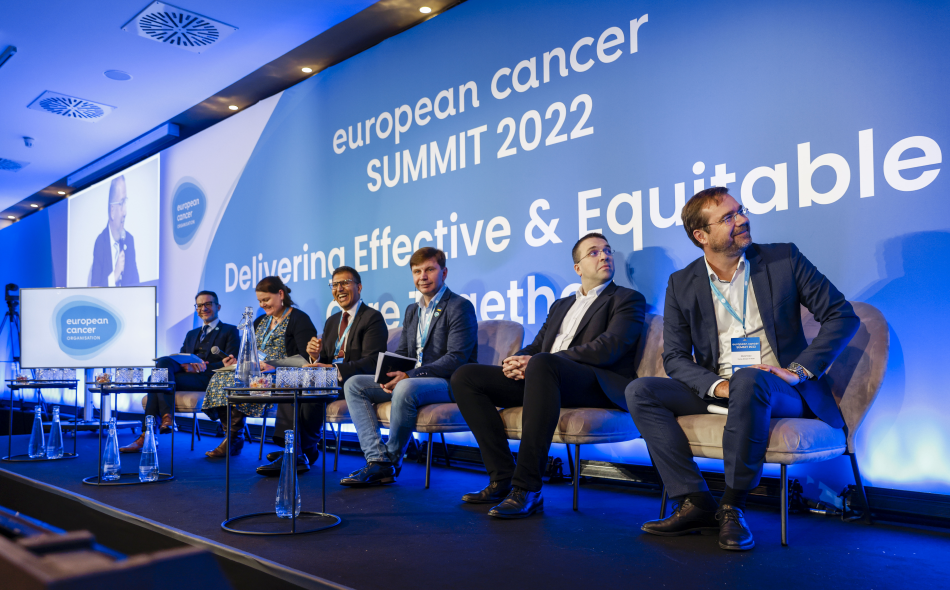
18:30-19:30 Networking Drinks Reception
At the conclusion of the European Cancer Summit 2022, we invited all participants to join a networking reception to celebrate the launch of the National and European Parliamentarians for Cancer Action group and European Cancer Pulse, alongside sharing views, ideas and responses to the questions and challenges raised by the Summit sessions. We joined forces for the policy actions to be taken in the year ahead!
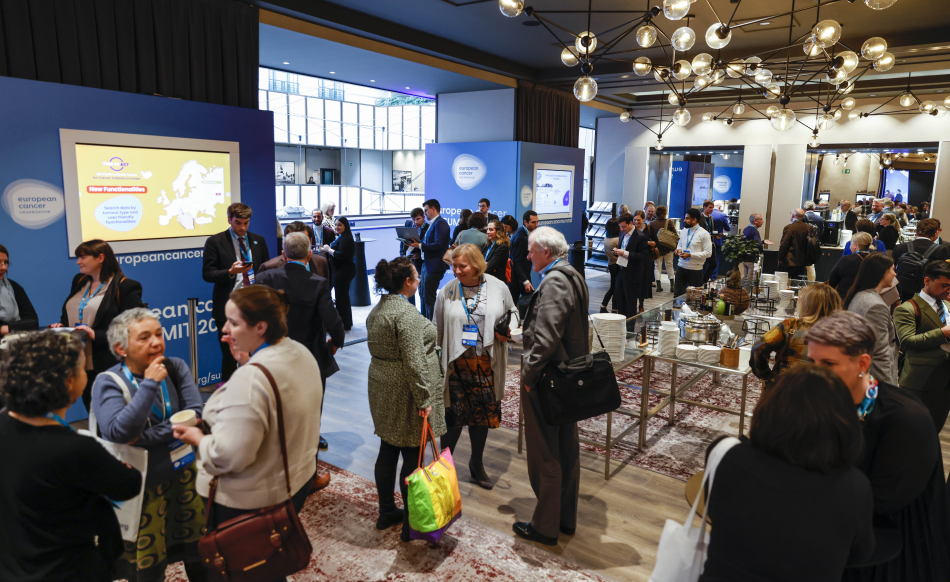
Speakers
-
Stella Kyriakides European Commissioner for Health and Food Safety
-
Mariya Gabriel European Commissioner for Innovation, Research, Culture, Education and Youth
-
Hans Kluge Regional Director, World Health Organization Europe (WHO Europe)
-
Jakub Dvořáček Deputy Health Minister for the Czech Presidency of the Council of the European Union
-
Sara Cerdas MEP Board Member, EU40, and Member, Special Committee on the Covid-19 Pandemic (COVI)
-
Deirdre Clune MEP Member, Special Committee on the Covid-19 Pandemic (COVI)
Click here for more information on this year's 17 selected abstracts. To learn more about he Young Cancer Professionals (YCP) group click here.
Speakers
-
Stella Kyriakides European Commissioner for Health and Food Safety
-
Mariya Gabriel European Commissioner for Innovation, Research, Culture, Education and Youth
-
Hans Kluge Regional Director, World Health Organization Europe (WHO Europe)
-
Jakub Dvořáček Deputy Health Minister for the Czech Presidency of the Council of the European Union
-
Sara Cerdas MEP Board Member, EU40, and Member, Special Committee on the Covid-19 Pandemic (COVI)
-
Deirdre Clune MEP Member, Special Committee on the Covid-19 Pandemic (COVI)
Click on the badges below to be taken to the virtual Summit 2022 hub of our member societies and patient advisory committee.
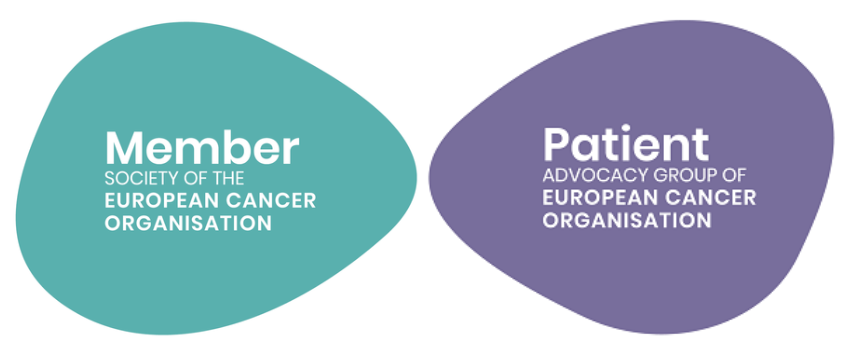 |
Click on the badge below to be taken to the virtual Summit 2022 hub of our Community 365.
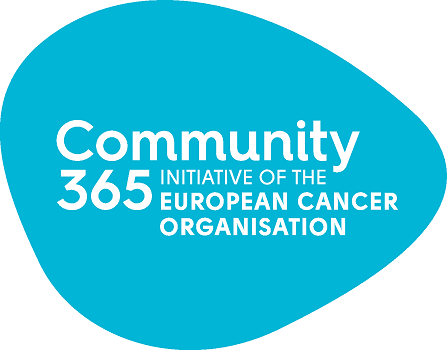 |
Click on the badge below to be taken to the virtual hub of our Summit 2022 supporters.
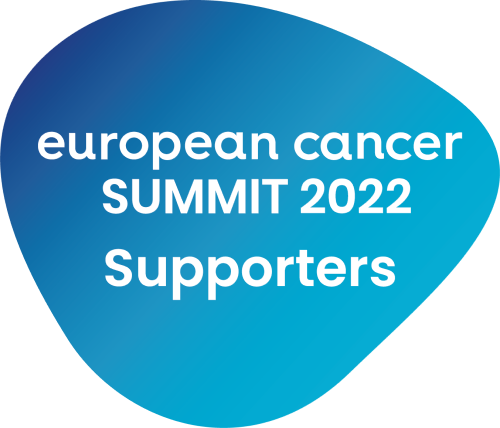 |
Speakers
-
Stella Kyriakides European Commissioner for Health and Food Safety
-
Mariya Gabriel European Commissioner for Innovation, Research, Culture, Education and Youth
-
Hans Kluge Regional Director, World Health Organization Europe (WHO Europe)
-
Jakub Dvořáček Deputy Health Minister for the Czech Presidency of the Council of the European Union
-
Sara Cerdas MEP Board Member, EU40, and Member, Special Committee on the Covid-19 Pandemic (COVI)
-
Deirdre Clune MEP Member, Special Committee on the Covid-19 Pandemic (COVI)
Supporters of the European Cancer Summit 2022
-
Member Societies of the European Cancer Organisation
-
Patient Advocacy Groups of the European Cancer Organisation
-
Community 365 of the European Cancer Organisation
-
Journal of Cancer Policy
-
touchONCOLOGY
-
Cancer World
-
ecancer
-
visit.brussels
-
Wondr Medical
-
EU40
-
London Global Cancer Week
Speakers
-
Stella Kyriakides European Commissioner for Health and Food Safety
-
Mariya Gabriel European Commissioner for Innovation, Research, Culture, Education and Youth
-
Hans Kluge Regional Director, World Health Organization Europe (WHO Europe)
-
Jakub Dvořáček Deputy Health Minister for the Czech Presidency of the Council of the European Union
-
Sara Cerdas MEP Board Member, EU40, and Member, Special Committee on the Covid-19 Pandemic (COVI)
-
Deirdre Clune MEP Member, Special Committee on the Covid-19 Pandemic (COVI)


